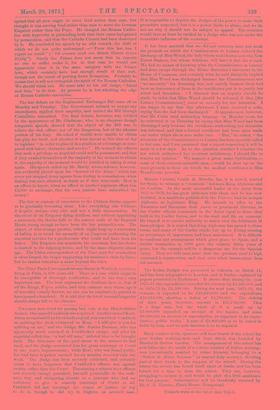Two men were tried for passing bad coin at the
Herefordshire Assizes. One named Craddock was acquitted. Another named Kent, whom counsel said Craddock had tempted, was convicted. Craddock on quitting the dock whispered to Kent, "I will give it you for splitting on me," and the Judge, Mr. Justice Denman, who was apparently much annoyed at Craddocks's escape, and after his acquittal called him "a bad old man," ordered him to be brought back. The Governor of the gaol swore to the menace he had used, and the Judge sentenced him for gross contempt of Court to one year's imprisonment ; while Kent, who was found guilty, but had been in prison untried for six months, received only one week. The Judge has been severely criticised, and certainly seems to have forgotten that Craddock's offence was against society rather than the Court. Threatening a witness is an offence not severely enough punished, but still punishable in the ordi- nary way, and whispering threats to a prisoner who had no testimony to give is scarcely contempt of Court at all. Craddock did not interrupt the course of justice, or try to do it, though he did try to frighten an accused man. It is impossible to deprive the Judges of the power to make their procedure respected, but it is a power liable to abuse, and we do not see why it should not be subject to appeal. The sentence would then at least be ratified by a Judge who was not under the immediate influence of the contempt.


































 Previous page
Previous page